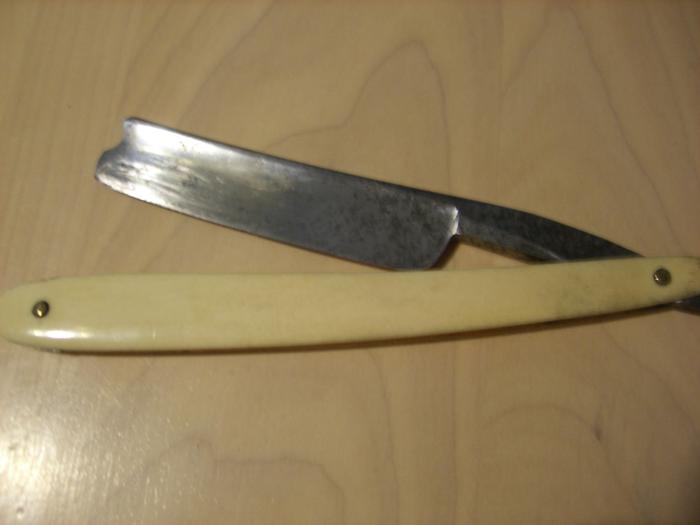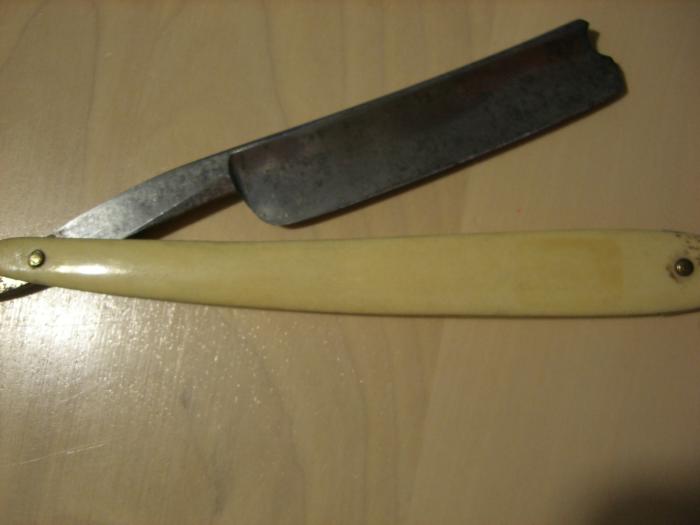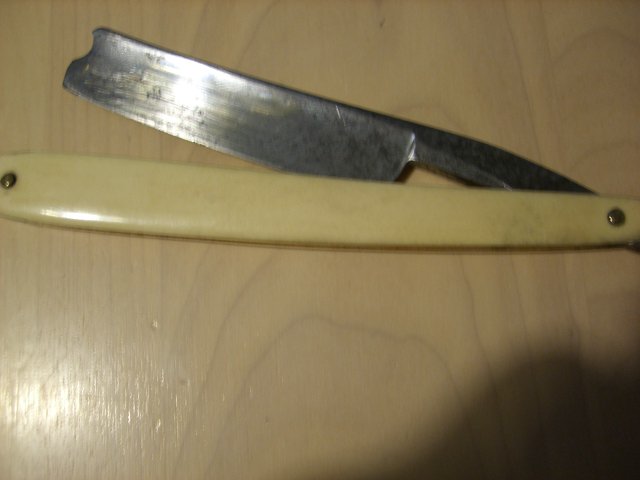Results 1 to 8 of 8
Thread: Wade and Butcher Restoration
-
08-26-2009, 10:54 PM #1Member

- Join Date
- Jul 2009
- Location
- Ottawa
- Posts
- 50
Thanked: 1 Wade and Butcher Restoration
Wade and Butcher Restoration
I just received a beaten up Wade and Butcher that I ordered through Ebay. I'll remove all the patina and bring it as close as possible to mirror finich and then send it for honing. There are a few nicks on the edge. Is it something that came be corrected by a master honer ? It is a 5/8 and I know very little will have to be removed.
I was thinking of stag scales, but seeing the width of the blade, I think I'll go with wood. My uncle is an avid hunter and has been sculpting and making kitchen cabinets all his life. I'll ask him to make a nice pair of scales for this one. Any idea for wood ?


Thanks for any tip
-
08-26-2009, 11:21 PM #2At this point in time...




- Join Date
- Jun 2007
- Location
- North Idaho Redoubt
- Posts
- 27,037
- Blog Entries
- 1
Thanked: 13249
Great ideas there but before you go crazy on that razor, I can't really tell from the pics, but those could be Ivory scales on there and they are valuable if they are real....
-
The Following User Says Thank You to gssixgun For This Useful Post:
Kingfish (08-27-2009)
-
08-26-2009, 11:37 PM #3Member

- Join Date
- Jul 2009
- Location
- Ottawa
- Posts
- 50
Thanked: 1
While (carefully) removing the pin with a file, I noticed that the scales did look like something animal. I've never seen ivory, so cannot tell, but they do have little brown dots like you can find on bones. I'll make sure not to send them to the curb next Tuesday.
-
08-27-2009, 01:37 AM #4

If it has holes then it is most likely is bone... but as Glen suggested... one should always determine whether or not those "off white" scales are Ivory before ripping off good original scales.
Razors with original ivory scales are very valuable... however it's your razor... do with it as you wish.
-
08-27-2009, 03:28 AM #5Senior Member

- Join Date
- Apr 2009
- Location
- Arizona
- Posts
- 325
Thanked: 127
From the photos you supplied it is hard to tell if there are any issues with the blade for honing. It will have to be looked at with much closer, like with a 30x loop or a 60x microscope, but from what I can see there doesn't seem to be any issues with it.
If you are going to use a buffer to finish the blade, go here and read this thread first. It is a great primer on the safety of buffing. One thing to keep in mind though is never ever let the blade get hot. Remember the edge gets hot much faster than the rest of the razor while buffing. Keep it cool - always, so you don't lose the temper and ruin the razor.
Good luck with your project.
Ray
-
08-27-2009, 01:38 PM #6Razor honing maniac


- Join Date
- Jun 2009
- Location
- On the beautiful St. Croix river
- Posts
- 228
Thanked: 51
So, if there are ways to test and see if these scales are bone, are there any ways to tell if they are if fact ivory?
I would like to be able to tell the difference between the two.
I have a pair of scales and they have little lines in them but no holes. Is this one way to tell?
Thanks,
BillW
-
08-27-2009, 01:45 PM #7

If they are ivory they will have a grain almost like wood that you may or may not have to turn in light to see. The grain may be wavy and in celluloid faux ivory you will find an imitation grain but it will be totally uniform. The real mc'coy will be somewhat random IME.
There won't be any specs in the ivory while there will be if it is bone. These 'specs' are like little dashes which IME will usually be more prevalent on both ends than in the middle and will be a darker color than the rest of the bone.Be careful how you treat people on your way up, you may meet them again on your way back down.
-
The Following User Says Thank You to JimmyHAD For This Useful Post:
turbine712 (08-27-2009)
-
08-27-2009, 02:23 PM #8

The way to tell ivory from celluloid is a Hot Pin Test. Heat up a pin till red hot, and press it against the scales in an inconspicuous area. Not too hard! Celluloid/plastic will melt instantly and form a hole upon touch. Ivory and bone will not melt, but may leave a small brown patch.
If you have already unpinned it, look at the insides. Ivory will have saw marks usually where it was cut from a tusk.
Ivory and bone can look very similar, especially if the bone has been taken to high polish. Bone often has grain holes, whereas ivory will never.
Look at the scales in the light - and tilt it at different angles. Ivory will have an alternating grain, whereas bone doesn't. Or hold it up to a light. Bone has capillaries where blood used to run, vessels.
I can easily tell the difference now, and have a love for ivory (and Wade & Butchers! Nice razor btw) But it isn't always easy to tell if you haven't seen it before.
Those little black lines at the wedge end make me feel inclined to say it is bone, however they seem quite limited to that end, and above all it is a photo and I have no way of knowing if they will clean off. In any case those definately are not celluloid!Last edited by Scipio; 08-27-2009 at 02:33 PM.


 LinkBack URL
LinkBack URL About LinkBacks
About LinkBacks






 Reply With Quote
Reply With Quote

